The 10th Rugby World Cup is over. After seven weeks, at times drawn out, at others exhilarating, South Africa has become the first nation to win four trophies, edging out New Zealand 12-11, in a gripping final, in Paris.
This was a final befitting of the host nation, France. Not always perfect, not always easy to understand, but always with an underlying sense of excellence and of history.
Despite the claims of Ireland, France and, belatedly, England, here was rugby’s two greatest rivals, and two greatest exponents, slugging it out for the game’s highest prize. Everything exactly as it should have been.
As referee Wayne Barnes awaits his cue to begin the final, Paris’ niggly, light drizzle is persisting. Curiously, the final few moments before the match begins are punctuated by the sound of Acca Dacca booming through the stadium PA. It’s as if some kind soul has allowed Australia to at least play some small role in proceedings.
The kick-off by Beauden Barrett is poor, allowing South Africa an easy exit to just beyond halfway. That surely wasn’t part of the plan.
Within two minutes, Shannon Frizell is off, sin-binned for an untidy clean out which saw him fall onto Bongi Mbonambi’s knee. Handre Pollard needs no second invitation to open the scoring, albeit in-off the upright.
Mbonambi is helped to his feet, but is clearly struggling. This is an early test for Rassie Erasmus’ selection strategy, having opted a month ago to replace the injured Malcolm Marx with Pollard. The All Blacks have to go ten minutes without Frizell. Can the Boks go 78 minutes with Deon Fourie at hooker?
The early exchanges are a wash, the All Blacks probing but not making any headway with the ball. Under pressure, Richie Mounga fails to deal with a Pollard high ball, but his teammates scramble their way out of danger.
Ten minutes in, Cheslin Kolbe runs a kick back, then skews an ugly kick which fortuitously ends up with Damian Willemse. South Africa swing into attack, with all of the territory and pressure their way. Pollard duly knocks another one over for 6-0, but the All Blacks will feel they came out of that little period relatively intact.
It takes 13 minutes for the All Blacks to win a penalty and they kick to their first attacking opportunity near the 22. They build an attack, and a chip by Jordie Barrett almost brings the opening try. Any number of directions for the ball to bounce will deliver Ardie Savea the try, but instead, it bounces the only way it can save South Africa, into the arms of Willemse. Playing under advantage, Mounga halves the deficit, but it’s one of a few pieces of misfortune that will haunt the All Blacks.
From the restart, Savea is judged to have not released in the tackle. On a night where the Springboks worked hard to successfully slow down the All Black ruck recycle, it feels like a harsh call. More so when Barnes, having watched the replay, apologises to Savea for getting his call wrong. Pollard just sneaks it over from 47m, and it’s 9-3.
Despite their stuttering start, the All Blacks are keen to play. Rieko Ioane almost punches through, but Will Jordan spills a tough pass. It’s the first opportunity for the Boks to flex their scrum muscle on their own feed.
The first quarter is over in a flash. It’s an arm-wrestle, but South Africa’s midfield defence, and New Zealand persisting to play into it, is giving them the edge.
In the 23rd minute Codie Taylor smashes Willemse over the sideline but the moment is lost when South Africa steals the lineout. Never mind, the All Blacks enter the 22 again, with another chance to build and sustain pressure, but this time Taylor’s throw is wildly over the top. Where has the ruthless efficiency of the last month gone?
It’s a pivotal error. Instead of defending inside their 22, the Boks are able to take possession, where Jesse Kriel eventually steps into Sam Cane’s right shoulder. Cane is shown a yellow card. As he jogs from the field, he is already fearing it will be worse. New Zealand are making it impossible for themselves.
Just before the half hour Brodie Retallick picks off a lineout but Beauden Barrett’s kick ahead slides dead in goal. Error is piling upon error.
And now, Barnes delivers the news to Savea that Cane’s card is upgraded to red. Kriel was low into the contact, but he was always low, not slipping down, the mitigation and wriggle room Cane needed. If there has ever been a defining moment in a World Cup final, this is surely it.
The topic on everyone’s lips before and during this World Cup was the lop-sided nature of the draw. In the way that only World Rugby can engineer, the fixture reflected a world order long since superseded, to the point where everyone knew that the critical juncture would be quarter-final weekend in Paris, where two of the world’s four best sides would exit the tournament.
For one weekend at least, it proved to be an unintended masterstroke. New Zealand’s 28-24 win over Ireland, and South Africa’s 29-28 win over France showcased rugby of the highest order. Epic contests; confrontational, skilful and daring, both finales chock-full of tension and high drama.
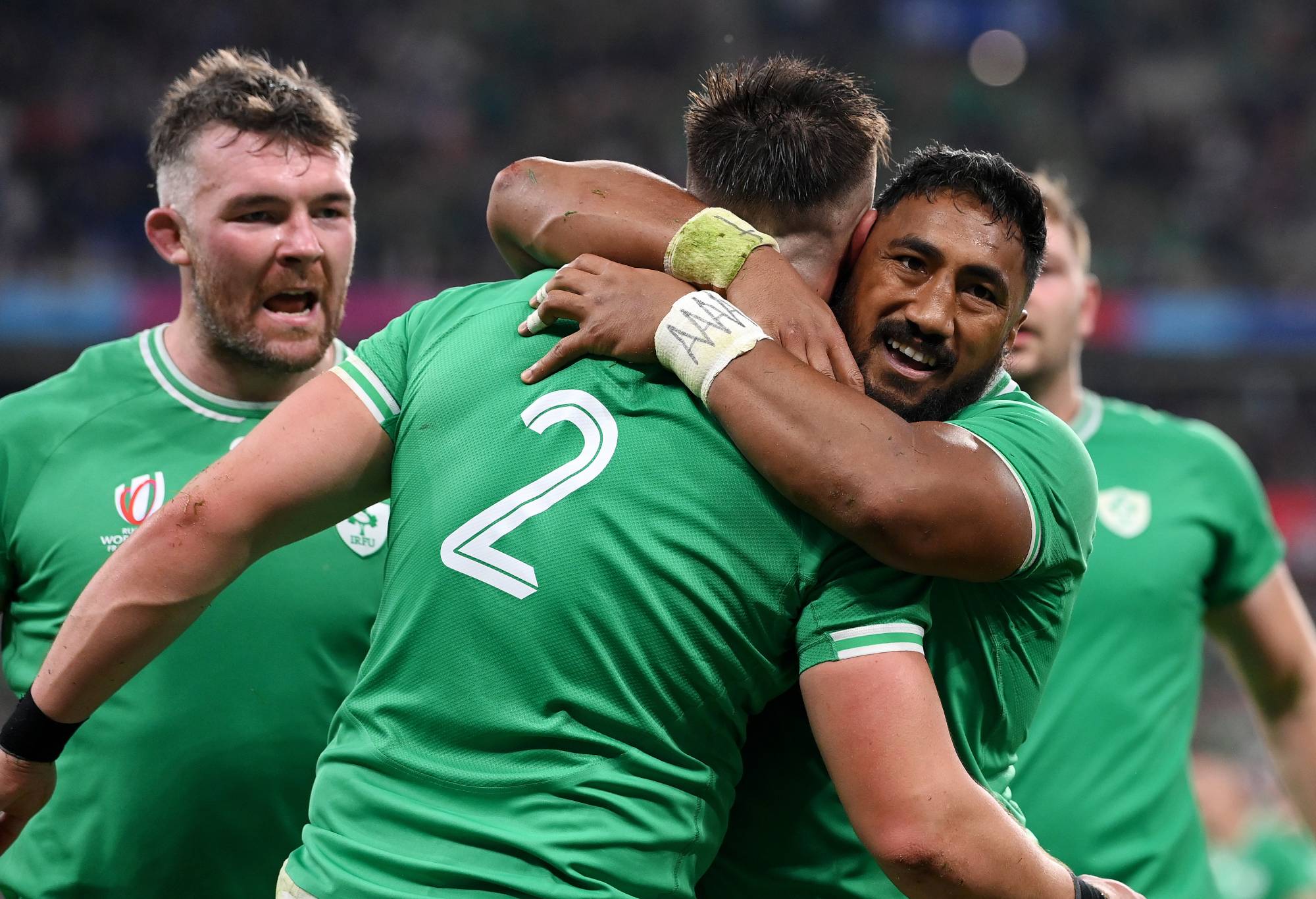
(Photo by Stu Forster/Getty Images)
The Marseilles section, while notably a notch or two down in class, was no less compelling. Many in the media and fans across social media piled in to anoint it the greatest weekend of rugby, ever.
The cost of that quarter-final magic was a semi-final squib. In the big picture though, did it really matter? After all, only two of those top four teams were making the final, whichever way it played out.
Yes, there was the matter of the host nation disengaging early, and the ‘sea of green’ drifting away on the tide. Some of the momentum and logical progression from pool phase to final was lost. But until rugby is strong enough to have eight nations realistically contending, instead of four or five, that’s an issue that will continue to hang over the tournament regardless
As always, this was a tournament with a clear demarcation between the pool and elimination phases. That’s not problematic, but something to be celebrated and used to advantage.
For the majority of competing nations, making the quarter-finals is a distant dream. For those teams, and their touring fans, the World Cup is all about savouring the rugby and tournament experience; striving to perform their best, but without carrying around the angst and gravitas that the serious contenders do.
In that way, everyone is able to share in the joy of watching a nation like Portugal exceed expectation, see Chile for the first time and cotton on to their obvious potential, and to hitch a ride with Samoa, as they overcame a disjointed start and improved to the point where they nearly beat England.
For decades rugby followers have looked on at South American football, and its vibrant, uninhibited fan culture with a fair amount of jealousy. Even if World Rugby hasn’t properly grasped how to leverage it, this jewel is now falling into rugby’s lap.
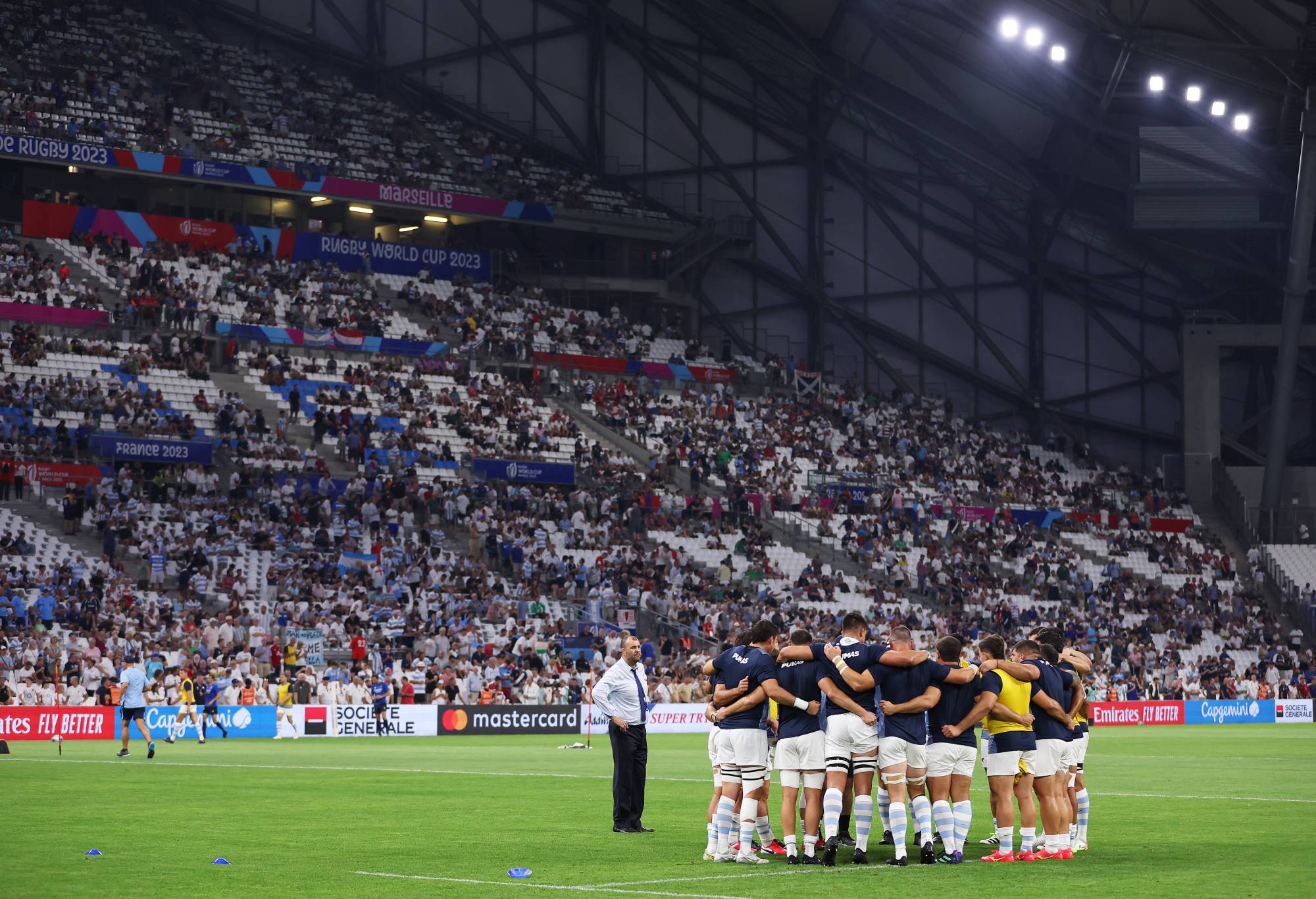
(Photo by Cameron Spencer/Getty Images)
The expansion to 24 teams for the 2027 World Cup does little for the nations at the pointy end, and the mechanism to arrive at a round of 16 is a little clunky. But adding another four developing nations is a boon for the early phase of the tournament, not to mention Australia’s tourism industry.
Ditching the bye and shaving a week off the tournament is a win for everyone, as is the shift to hold more mid-week matches and maintain a daily cadence. And in a country where rugby is clearly struggling to maintain a profile, let alone a positive one, more teams, more matches spread across more locations, more travelling fans, more colour, are all a welcome bonus.
But that’s for next time. Setting aside the two finalists, which sides enhanced their reputation in France and who fell short of the mark?
England clearly exceeded expectation, missing the final by a hairsbreadth. No-one could deny their spirit and application, but in the cold light of day, any side which narrows their scope of play to such an extent is always going to be vulnerable in a low-scoring match.
The avalanche of post-match eulogising laid it on far too thick, but also overblown were the claims that England making the final would mean the death of rugby. It will be interesting to see where Steve Borthwick takes this side from here.
Fellow semi-finalist Argentina, secured a solid quarter-final win against Wales, preceded by an impressive win over Japan in Nantes, in a highly enjoyable afternoon fixture. But so abject were they in their opener against England, and so off the pace in their loss to the All Blacks, they rate no more than a pass.
Ireland carried the burden of being the world’s number one ranked team, on a 17-match winning streak, and of never having got past a quarter-final. Their mass of loyal fans deserved more than what they got, as did coach Andy Farrell, but after falling behind early to the All Blacks, they were never quite able to make things right.
France also carried a burden, expectations only raised higher after their convincing opening night triumph over the All Blacks. Star halfback Antoine Dupont provided one of the sideshows of the tournament, with daily updates on the status of his nasty cheekbone injury eagerly awaited and devoured.
Like Ireland, theirs was a sad loss, but bookending the audacity and ferociousness of their opening quarter against South Africa with a final quarter substantially less certain cost them dearly.
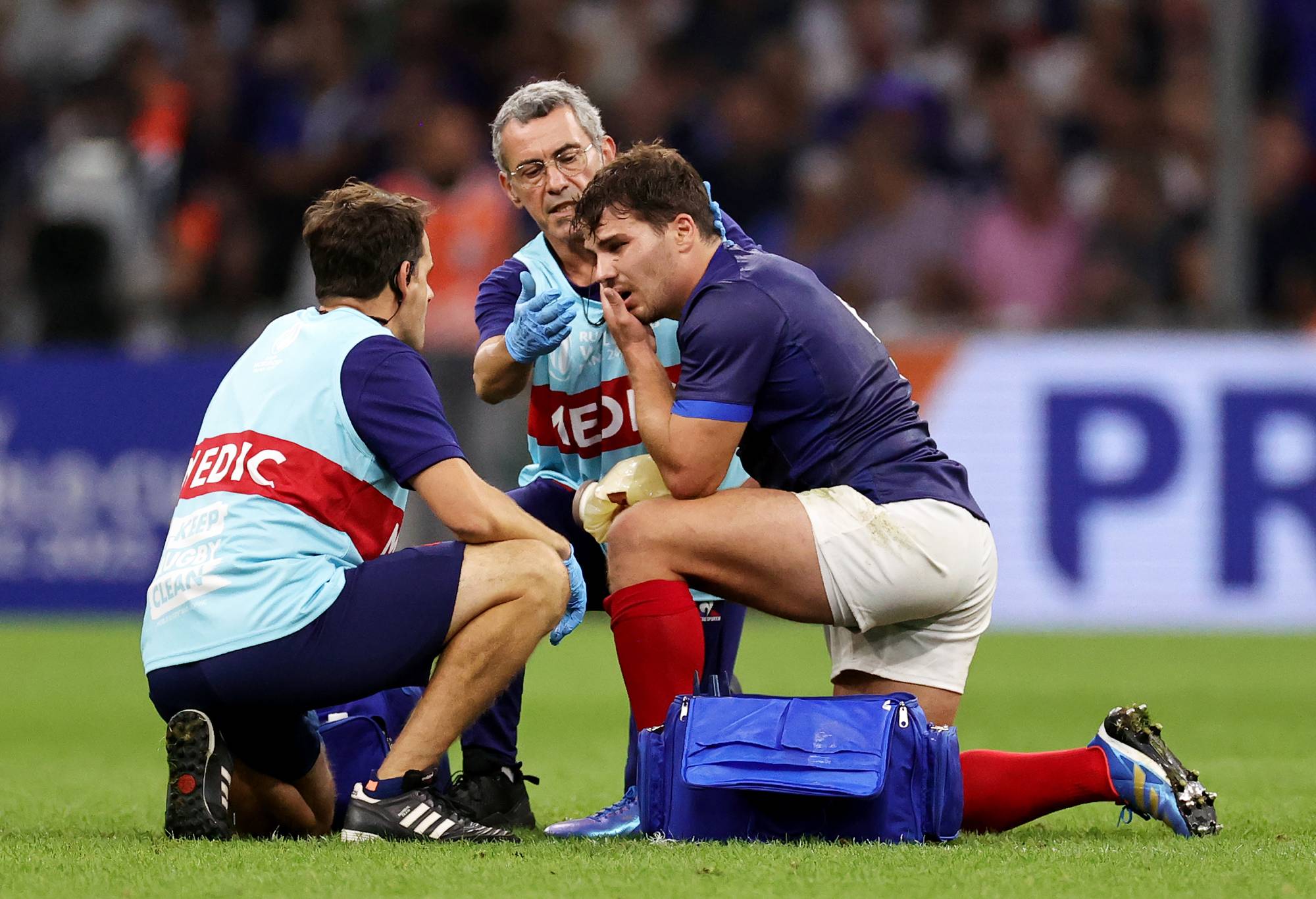
Antoine Dupont of France receives medical treatment following head contact with Johan Deysel of Namibia . (Photo by David Rogers/Getty Images)
Fiji’s high mark came at Australia’s expense, 25-18 in St Etienne, but the nature of that win – achieved through scrum and maul dominance, well-organised defence, and discipline – pushed them into an uncertain no man’s land, where they were never really able to blend that clinical efficiency with the essence of their natural game.
Departing coach Simon Raiwalui was rightfully lauded, not only for his achievement in taking his side to an historic quarter-final, but for his refreshing ‘everyman’ honesty and graciousness. For now, his re-acquainted family are the winners, but it feels like there is another interesting chapter-in-waiting for this fine rugby ambassador.
Despite their quarter-final exit, Wales also enjoyed a good tournament, making the best of what they had. Which for Australian fans left lamenting in Lyon, was more than ample.
Of the non-qualifiers, Portugal’s crazy win over Fiji was an out and out highlight. Everyone wants more of where that came from. Japan’s Amato Fakatava scored the try of the tournament, but their regression from 2019 is a lesson to all about the importance of establishing and maintaining elite level pathways.
Scotland fell foul of what, for them, really was a pool of death; not a million miles off the pace against South Africa and Ireland, but well beaten nevertheless. They should benefit from the re-jigged tournament structure in 2027.
Italy was another to regress, nobody seeing the 96-17 mauling at the hands of the All Blacks, coming. Other sides to cop cricket score losses were Romania, Namibia and Chile, but all had their promising moments.
Somewhere in the middle fell Georgia, Uruguay, Samoa and Tonga. All containing plenty of quality in their ranks, all wondering how they will be able to gain enough exposure against better opposition, to help them progress.
Which leaves one nation, Australia.
Whether Dave Rennie and his coaching group would have enjoyed the fast lane taken by England and Argentina to a semi-final is of course hypothetical. But what can’t be denied, is that when Rennie’s World Cup campaign was cut-off at the knees, nine months out, that was the day Australia’s chances at this World Cup expired.
Without sufficient time to cobble together a credible coaching group, and to make his mind up about his playing squad, Eddie Jones, despite all the bluster about a “smash and grab raid” on the cup, was always on a hiding to nothing.
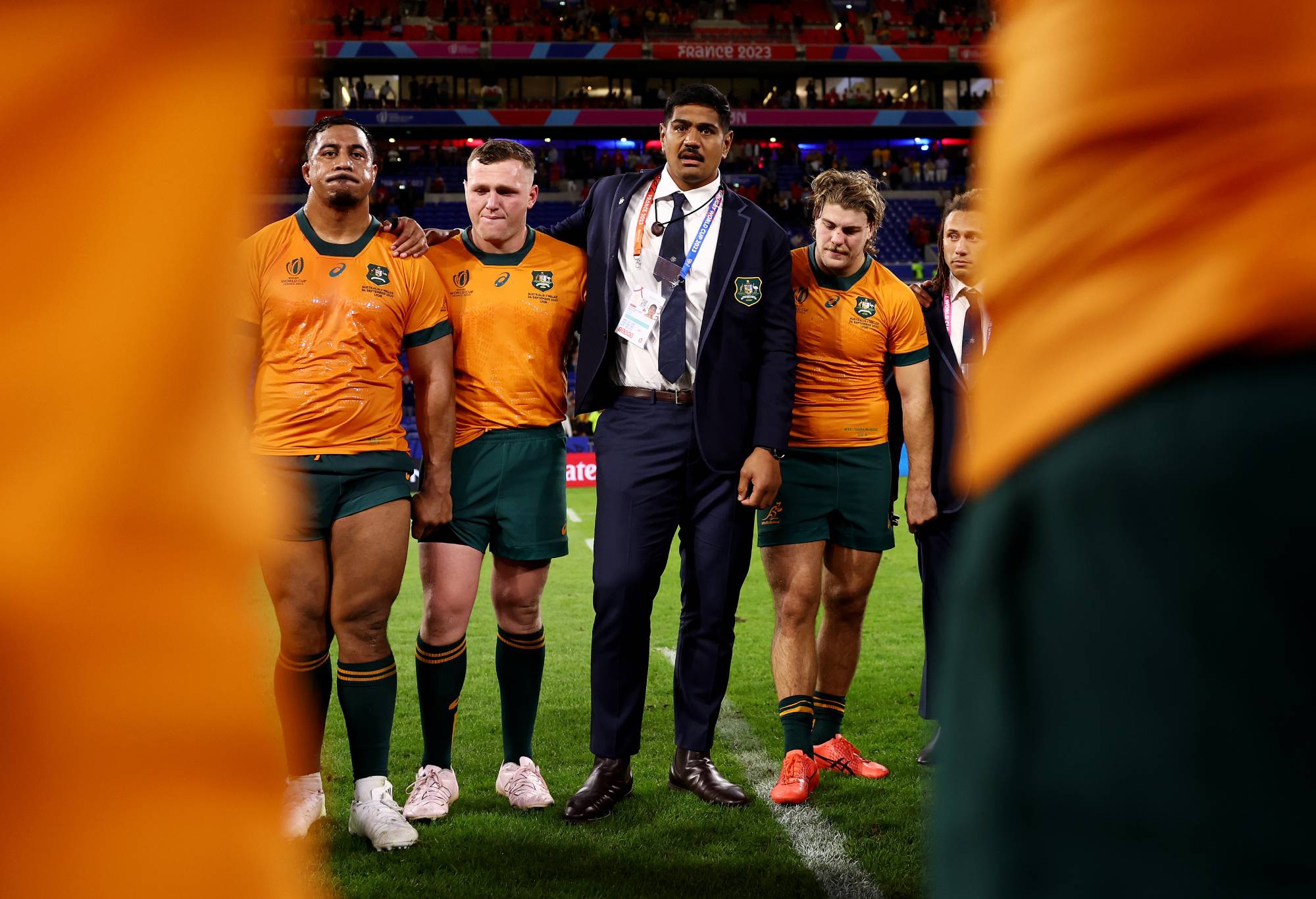
Wallabies captain Will Skelton speaks to the squad after their World Cup loss to Wales. (Photo by Chris Hyde/Getty Images)
As was his squad, by comparison to the better performed nations, sorely lacking in experience. Even if it was adopted as a convenient afterthought, the idea that a youth-led rebuild was so urgently required that this whole World Cup campaign had to be scuttled, is highly questionable.
South Africa hitting the pits of a 57-0 loss to New Zealand in 2017 and winning a World Cup two years later demonstrates how, with the right personnel and structures in place, things can be turned around relatively quickly.
Australia using this World Cup as a notional exercise to prepare for the next one was not only unprecedented, it was highly disrespectful to fans, many of whom who had forked out thousands of dollars for what they might reasonably have thought was the trip of a lifetime.
“Don’t watch,” was the dismissive response provided by Rugby Australia chairman, Hamish McLennan, to fans upset at the Wallabies’ predicament. Not only was the tone of McLennan’s words entirely inappropriate, so was the timing; McLennan going public in the week leading up to the Wales match – when Australia still had a chance to qualify – in a cynical exercise to get his excuses in first.
McLennan subsequently assumed the role of SANZAAR kingmaker for the two new teams to add to the Nation’s Championship, telling media “we’ll have a look what’s out there and decide who’s best”.
In the context of Japan having more commercial strength than Australia, and Fiji just having sat the Wallabies on their arse, perhaps McLennan was trading on the renowned politeness of those two nations not to consider his comment arrogant and tone-deaf?
While the Jones ‘will he go or will he be sacked?’ circus has finally been resolved, the real story remains, ‘who is a suitable custodian at Rugby Australia to appropriately re-shape the game and bring everyone along with the change?’
With McLennan determined to bear no accountability for a disaster of his making, and Rugby Australia’s governance structure not conducive to holding him accountable, this is a critical juncture for the future of Australian rugby.
With Jordie Barrett required to shore up the scrum, Faf de Klerk and Pollard play into the vacant space and the Boks force a 5m defensive lineout for New Zealand.
They clear but not for long; aggressive defence and intense breakdown work earning another three points for Pollard. 12-3.
With the Boks in this mood, it’s no place for New Zealand to be chasing the game, especially with Cane off for the match. Nevertheless, just before half-time, the All Blacks put the hammer down; Ioane just bundled out in the corner by Kolbe.
Eben Etzebeth is penalised for lazy running, and Mounga goals for 12-6. But given the impetus of their attack in the 22, New Zealand is justified in wondering why it wasn’t worth a yellow card. Such are the fine margins.
Retallick steals again at the front of the line-out, but Beauden Barrett dithers in midfield, and is caught with the ball; one of many smashing defensive efforts from Pieter-Steph du Toit. The half finishes with Fourie missing his target again, but this time it’s Lomax who can’t take advantage.
The All Blacks will be shocked by their error rate. If there isn’t a massive turnaround in the third quarter the cup is gone; if it isn’t already. Don’t forget, the Boks have a fresh forward pack to inject in the second half.
Soon after the restart Beauden Barrett spills a high ball and it looks curtains for the All Blacks as Kolisi sweeps forward. It is a carbon copy of the Springbok tries from their quarter-final against France, only this time, inexplicably, Kolisi holds on with spare men inside and out, and the try is lost.
By now, the impact of the red card is really being felt, with the Boks, from scrum ball, free to run into space in the centres. Kurt-Lee Arendse chases down a grubber but just fails to gather and score in the right-hand corner.
At 45 minutes another pivotal moment arrives. This time it’s Kolisi who collects Ardie Savea head on head, and he is sat down. Surely we couldn’t have both captains sent off in a World Cup final?
The All Blacks sniff an opportunity. Mark Telea, a handful throughout, regathers a kick, but it’s Mounga’s turn to drop it forward with play sweeping into the Bok’s 22.
The All Blacks’ backline timing and passing execution has been is a little bit off all night, but they’re now starting to ask harder questions; Taylor finds himself on the end of the line, and makes metres down the sideline.
With the momentum shifting, the All Blacks turn down a shot at the posts and kick for the corner, but their switch play behind the ruck is a little bit too cute and finds Jordan out of position.
News comes through that Kolisi will be allowed to return. Having initiated the contact with a stationary Savea, as opposed to Cane and Kriel running into each other, he is lucky, his bend into contact saving him. As ever, these are fine, fine margins.
In the 53rd minute Mounga makes something out of nothing, escaping the backfield, jetting into space and sending Aaron Smith over. Joy is shortlived however; play called back for a knock-on in the lineout transfer.
Still the World Cup final still doesn’t have a try, but the moment is close. The All Blacks press hard off an attacking lineout, before Jordie Barrett swings it wide for Telea to make just enough space and squeeze the ball out for Beauden Barrett to slither across out wide.
Mounga’s conversion misses to the right. Somehow, the All Blacks have fought their way back to 12-11, but in such a tight contest, these two points feel crucial.
From the restart, Smith’s exit kick is of the highest quality. There is a quarter of the cup final remaining, and everything still to play for.
In theory, France was the perfect host for a World Cup. It’s a true rugby nation, particularly across the south, where rugby towns and cities roll off the tongue; Toulon, Montpellier, Toulouse, Carcassonne, Pau, Biarritz, Bordeaux and many more.
Fans enjoyed access to a comprehensive train network, with every host city within easy reach of fans from other competing UK and European nations. And for those travelling from further afield, the opportunity for midweek side trips to delightful places like Annecy or Strasbourg, or to sneak across the border into Italy, Spain or Portugal, was too good to ignore.
Yes, there was the culture shock that came with bra utilization in Paris being a mere fraction of that at home, and smoking rates being many multiples more, but once adjusted, a treasure trove of gourmet delights, smooth Bordeaux and easy drinking Loire Valley Muscadet was there to be enjoyed.
For those accustomed to more of a ‘working class’ diet, it was a surprise to find that French KFC doesn’t actually sell pieces of chicken. On the upside, employing a strategy unfamiliar to Australian consumers, McDonald’s Chicken Nuggets are served hot.
Often stereotyped as unfriendly to foreigners, the common visitor experience was – some institutional and government employees excepted – to find French people everywhere unfailingly patient, friendly, helpful.
Even the security forces – a highly visible presence at all venues, armed to the hilt with automatic weapons – were as pleasant and unassuming as anyone with the capability to fill you with lead in a matter of seconds could possibly hope to be.
But it wasn’t all 50cl Blonde Bierre and Pain au Choclat.
While there were volunteers dotted around various locations, there was nothing like the number and the connectedness to the local community – the desire for the host nation to put its best foot forward – that existed in Japan in 2019.
Many things that were deficient in week one, remained that way for the whole tournament.
It was hard to gauge a sense of anyone in charge, to tweak things here and there or, for example, do the math on how many security personnel would be required to perform 80,000 (separate male and female) body searches, across a couple of hours. It was luck as opposed to good management, that prevented a dangerous crowd crush in in stifling heat in Marseille on opening weekend, turning into something more sinister.
I was involved in another crush in Toulouse, with crowds approaching from opposite directions funnelled into a needlessly narrow walkway, all because security personnel had chosen not to remove barriers put in place for the arrival of the two teams. Let’s hope the women and children I saw crying, scared witless by the experience, finished with fonder memories of their World Cup.
Infrastructure at major train stations was uniformly poor; long queues forming at ticket machines that were piss-takingly slow; that is, when they worked at all. For those who hadn’t twigged to pre-buy a return ticket, it was a shock on opening night to find just five ticket machines at Stade de France Saint Denis station, two of which were ‘out of service’.
It was less of a surprise to find, six weeks later, just the three machines still available, and hordes of angry fans wondering why they were queuing in the rain to buy a 3 Euro ticket, instead of having stadium-line train fares covered in their match tickets. Or an automatic turnstile tap and go payment option available.
With matches starting at 9.00pm, finishing around 11.00pm, the winner’s press conference wasn’t even scheduled to begin until midnight. With the last train departing at 00.17am, and a 15-20 minute walk to factor in, that presented a problem when it came to finishing articles and getting them up for a morning audience in Australia.
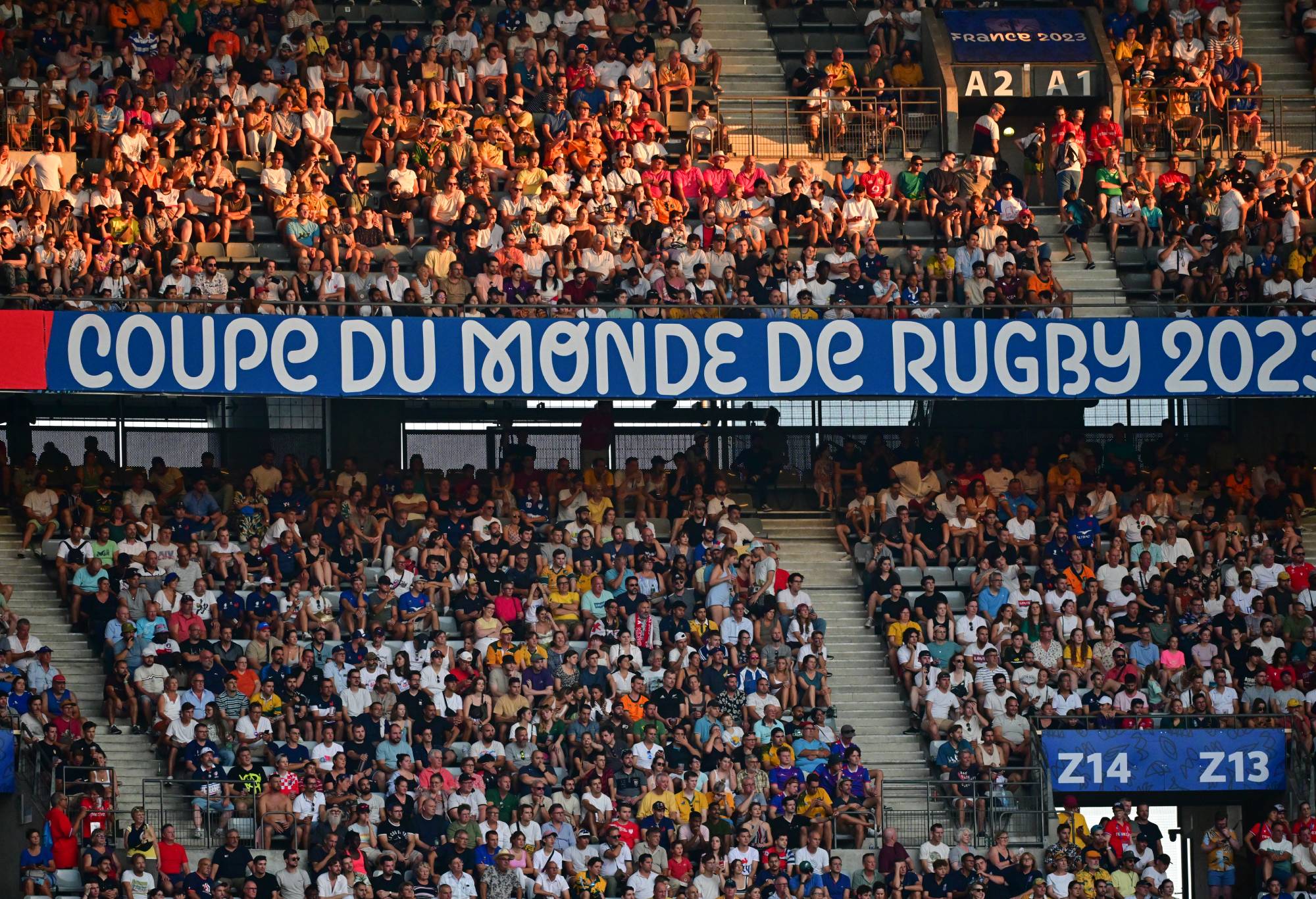
(Photo by Christian Liewig – Corbis/Getty Images)
That lack of unthinking extended to the farcical situation on quarter-final weekend where, with the two Marseilles quarter-finals starting at 5pm, media based in Paris for those matches were prevented from entering the media centre until well after 5.30pm, thus unable to watch the first half of Argentina versus Wales and England versus Fiji.
First world problems perhaps, but let’s hope Australia delivers a more thoughtful and adaptable experience in 2027.
The 2019 Cup suffered the intervention, in the final stages of pool play, of Typhoon Hagibis. It was serious business, with 118 lives lost and countless people left homeless as a result. Some matches were cancelled, but the rapidity with which the weather event passed, and an incredible volunteer effort ensured that, for the most part, the show went on.
The weather in France couldn’t have been more different. High humidity and temperatures in excess of 35 degrees necessitated the use of drinks breaks in the early rounds, and match after match was played in sunny, dry conditions.
Personally, I didn’t see my first rain until day 42, and while a persistent, scuffy drizzle set in for the final two weekends, conditions were never as bad as what some pundits made out.
With Neil Diamond’s ‘Sweet Caroline’ the scourge of rugby stadiums worldwide, the French crowds countered with La Marseillaise at every opportunity. If that seemed a little out of kilter at times, particularly in matches not involving France, it’s because it was.
The locals in the Stade de France semi-final crowd also reserved their worst for referee Ben O’Keeffe, for the crime of being on the whistle during their quarter-final loss a week earlier.
Rugby has always prided itself on displaying the values of respect for the referee, but with certain players slipping their standards, past referees posting on-line critiques, and influential figures like Rassie Erasmus normalising attacks on referees, perhaps it should come as no surprise to see the French dish it out to O’Keeffe as they did.
That this kind of treatment extended as far as an immigration official serving it up to O’Keeffe’s sister, upon her arrival at CDG Airport, probably said less about the French, but sent a message to the powers that be that more attention is needed.
Fourie’s confidence on the throw is shot. Retallick routinely putting pressure on at the front forces him to go long, where Scott Barrett is waiting. But yet again the All Black backs don’t quite get their handling and timing right.
At 63 minutes, Jordan has the ball stolen off him by Kwagga Smith, while airborne, providing the Boks with some hard-earned territory. It doesn’t last for long, a misplaced kick by Willemse allowing the All Blacks to again transition into attack.
With time ticking away, tension levels – on and off the pitch – are wound right up. 14 men or not, the crowd, and the Boks, have realised the All Blacks are not going away.
An exhausted Retallick, having left nothing on the pitch in his final Test, is replaced. De Klerk sneaks around the blindside but Mounga audaciously snatches his kick out of the air.
The All Blacks mount a furious attack off a ruck turnover. Telea, as he has been all night, is dangerous. Then Kolbe unlawfully blocks a pass and is out of the game. Jordie Barrett gets an opportunity from 49m. He has the range, but it slides agonisingly to the left.
At 74 minutes Anton Lienert-Brown is freed up on the right but Barnes rightly calls the pass forward. Oh, the irony.
A minute later, the All Blacks play their final card, Damian McKenzie on for Mounga.
Pollard drops back into the pocket, but his drop goal attempt is weak. Beauden Barrett runs it back but Du Toit hammers brother Jordie in a spot tackle which rocks the stadium foundations.
The All Blacks have the ball, but only three minutes to work with, and they’re at the wrong end. They manage to work their way past halfway, and a horrible clearing kick from Kriel gifts them one last attack. McKenzie cleverly creates space but Barnes finds a tiny knock forward from Lienert-Brown near the 22. The Boks now only have to clear the scrum.
The All Blacks have to find a scrum penalty on a night where both packs have barely budged an inch. It isn’t happening. South Africa is first to four cups.
As always, the intensity that envelopes a World Cup triggers discussion about the state of the game; what are the frustrations and where are we heading?
With 16 international head coaches, their assistants and tacticians, a glutton of administrators (how’s that for a made-up collective noun?), match officials, and the world’s rugby media, all in close quarters, along with the input of every keyboard warrior and his dog, it’s been a seven-week hot bed of ideas, complaints, expressed frustration and concern for the future.
One good thing that happened at this World Cup was that, at the half-way stage, the tournament looked like it was being devoured by increasingly voracious TMOs, determined to rule with a heavy hand, in the name of achieving some kind of rugby perfection.
To their credit, the refereeing fraternity sensed the issue and reset their parameters; to the extent where concerns around TMOs and red cards mostly fizzled out. Well, almost.
Unfortunately, we had tempted fate. Sam Cane’s red card was not the reason that New Zealand lost the final, but it was clearly a reason. And even if the All Blacks could process why his was judged to be a red card under today’s conditions, the obvious difficulty for fans was to reconcile why Kolisi’s was not.
Of course, every incident comprises a single set of circumstances, and it is pointless to make comparisons in any detail. But in a broader context, for matters like these that have such a high influence on a match, rather than have a TMO make a fine judgment call on what might constitute temporary or permanent banishment, a mitigating factor here or there, it makes far more sense to categorise these incidents for what makes them similar.
None of this is to criticise TMO Tom Foley. Yes, he was too great a presence in the final, but for the most part, his interjections were demanded by the circumstances, and the laws, not on a whim.
A solution – of sorts – already exists; SANZAAR’s 20-minute red card (or what some people would prefer to be called, an ‘orange card’). As a long-term advocate for player safety, I have no concerns whatsoever that the additional category would be seen by players as licence to relax their attention to safety and avoiding head contact; no player wants to be sat down for 20 minutes of a match.
But such a move would allow for a more sensible separation of deliberate and highly reckless acts of foul play, and the more careless and accidental collisions.
This is really an issue of common sense, and the sooner a rational middle ground is found, the sooner the game won’t continue to be held up for ridicule, from within and from the outside.
Refining this aspect of the game also doesn’t discount the spectre of concussion and CTE that hangs, and will continue to hang over the game. As it presently stands, card lotto has little to do with player safety.
The rugby fraternity is better informed and educated than it was four years ago, nevertheless, there is still a long way to go for rugby to properly understand all of the issues, and appropriately engineer a path forward that genuinely satisfies player welfare concerns, in concert with retention of the physical aspects of the game that so many people love.
During the tournament, there was the usual to’ing and fro’ing around styles of rugby – the battle for ‘good over evil’ – which were, as usual, mostly drawn on north versus south lines. By the end of it, the closeness of the scores throughout the final stage meant this could be probably be called a draw.
Rugby has always been a game where sides elect to play in a certain way; whatever is their DNA, or suits them on a particular day against particular opposition.
In my view, the criticism of England’s tactics in their semi-final against South Africa totally missed the point. Rugby sides have adopted a kick-first, kick-second and kick-last strategy ever since William Webb Ellis was a lad.
In all of the eulogising from the UK media, what was overlooked was that England actually lost the match; rendering calls for New Zealand to follow their successful blueprint somewhat curious.
Yes, it would be a problem for rugby if the laws and the way the game was officiated, incentivised sides all around the world, at all levels, to play like England did in this match. But they don’t, and they won’t.

England’s Owen Farrell. (Photo by Hannah Peters/Getty Images)
That said, World Rugby can and must be more pro-active at picking off the low-hanging fruit, not allowing the speed and flow of a match to be manipulated by sides intent on slowing matches down. In the semi-final, referee Angus Gardner was right to warn an Argentinian front-rower for taking his boot off, on the pitch, but in practical terms, where were the consequences?
Gardner could hardly have packed down a scrum without him, nor should it be up to any individual referee to mount a one-man crusade and swat away the hordes of water carriers and medics that have infested modern day rugby.
What is more self-inflicted, is how referees have allowed themselves to be subjected to verbal assaults from players, questioning seemingly every decision or non-decision that goes against their side. In this respect, rugby can choose from two sports; the slippery slope into the type of dissent seen in soccer, or as the AFL has done, eradicate dissent and throwing the ball away after a penalty, via their 50m penalty rule.
Word is that this will change, as it must. Rugby has always prided itself on being a game where respect for the referee is integral, and it is high time that referees return to allowing communication with the on-field captain only.
If they could just hang back on the self-congratulatory, back-slapping for a bit, World Rugby might consider the abuse of match officials chipping away at the culture and values of rugby as a matter of first-order importance.
The other headline issue of this World Cup was the fate of developing, ‘tier two’ nations, with respect to the newly announced Nations Championship.
Setting aside this announcement being made in the week of the cup final drawing attention from the main event, there was widespread condemnation of a move which looks to be designed to protect the interests of established rugby nations, and stunt the progress and ambitions of many others.
That remains to be seen, and as always, as in any professional sport, there should be a reasonable balance sought between maximising revenue opportunities, and regenerating and refreshing the sport.
The common complaint aimed at World Rugby is that the body is too conservative, too cumbersome, and too slow to identify and act on issues. To this list we can now add, member nations too beholden to private equity interests; financial partners who risk tipping that balance too far, away from bigger picture rugby interests, towards their balance sheets.
Some people might say that to win three consecutive elimination matches by a single point is a lifetime’s worth of luck. But while all of those matches could have gone the other way – and on another night, might have – finals rugby is about having your nose in front when it counts; at the end of 80 minutes.
In this respect, South Africa is the archetypal, professional unit. Acutely aware of its strengths, fiercely unwilling to play into its weaknesses.
No side trusts their defensive pattern and execution like South Africa does. And with Pieter-Steph du Toit playing out of his skin, adding bucket loads of starch to his defence, it would have required something extraordinary for these Springboks to have been beaten.
Architect Rassie Erasmus has gotten away with his 7/1 bench split but almost didn’t get away with his gamble at reserve hooker. But isn’t that another marker of a champion side? Despite the All Blacks continually disrupting South Africa’s lineout ball, the Boks were able to limit the damage, near to, or right at the source.
The All Blacks’ outstanding second half is a credit to them, and to a tournament which has produced a number of games of similar ilk. Looking at them clutching their runners-up medals, they are obviously hurting, knowing how close they came to what would have been one of the finest victories in a history of many.
They deserve more, simply for not being blown off the park, let alone finding it within themselves to dominate the second half. But in the end, they paid for their first half inaccuracy, and for missing two difficult, but kickable goals.
As always, to the winner go the spoils; to the loser, the ‘what ifs’ and ‘maybes’.
It’s been a wonderful 7 weeks; the quality of the rugby high, the French experience one that fans from around the rugby globe have savoured with relish.
The rain has returned now, heavier than before, but not enough to impede the fireworks that are now piercing the Paris night sky.
The narrow margins separating the top nations mean that was a very different cup to last time. Different that is, until it wasn’t. At the end of all of the battles, it is the same captain holding the World Cup aloft, in the same green jersey.
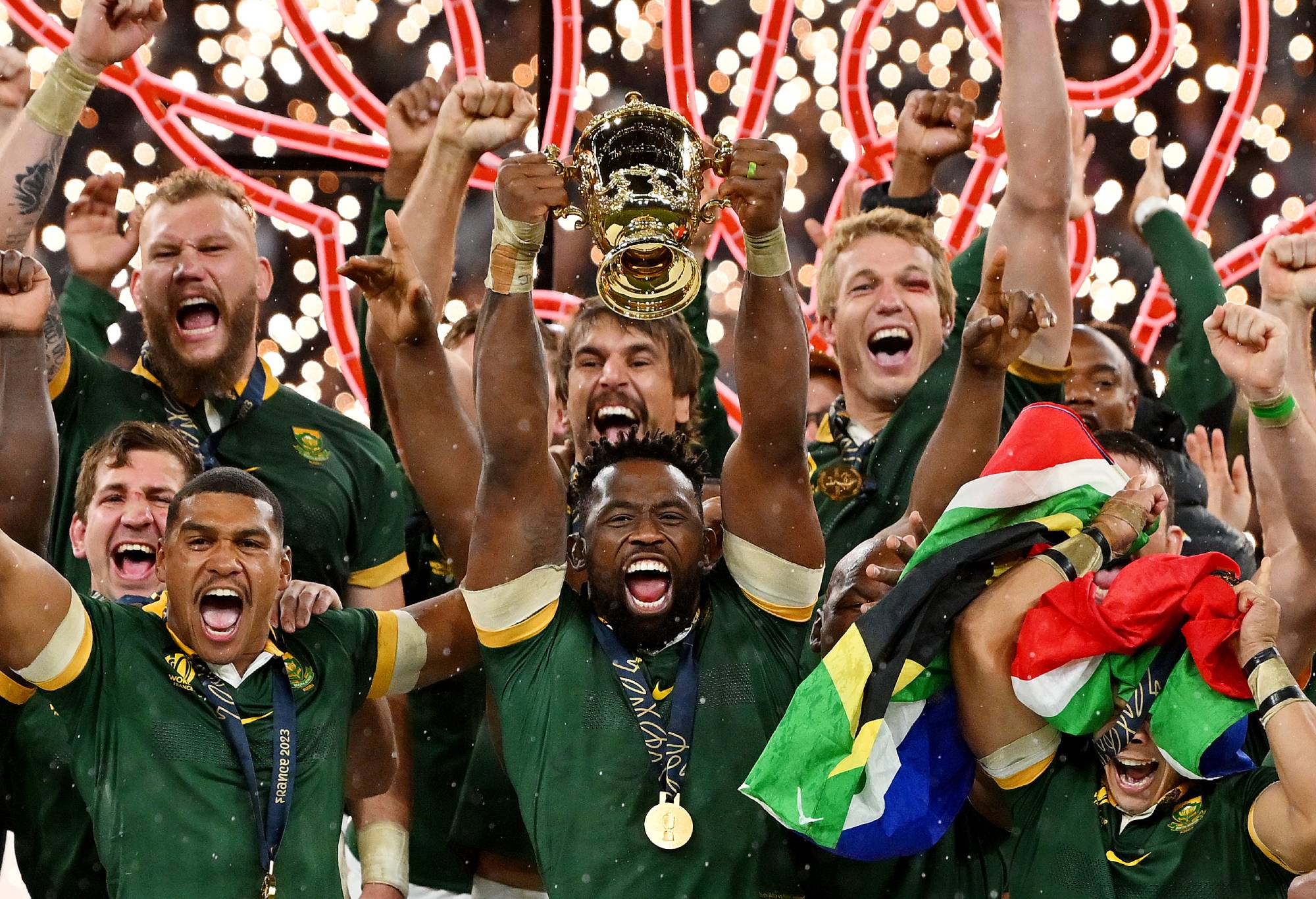
Siya Kolisi of South Africa lifts The Webb Ellis Cup following the Rugby World Cup Final match between New Zealand and South Africa at Stade de France on October 28, 2023 in Paris, France. (Photo by Dan Mullan/Getty Images)



































































































